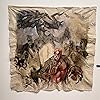Reader Q&A
To ask other readers questions about
Maus II,
please sign up.
Answered Questions (9)
Carrie LeAnne
This book is fairly short.
Unanswered Questions (1)
About Goodreads Q&A
Ask and answer questions about books!
You can pose questions to the Goodreads community with Reader Q&A, or ask your favorite author a question with Ask the Author.
See Featured Authors Answering Questions
Learn more






